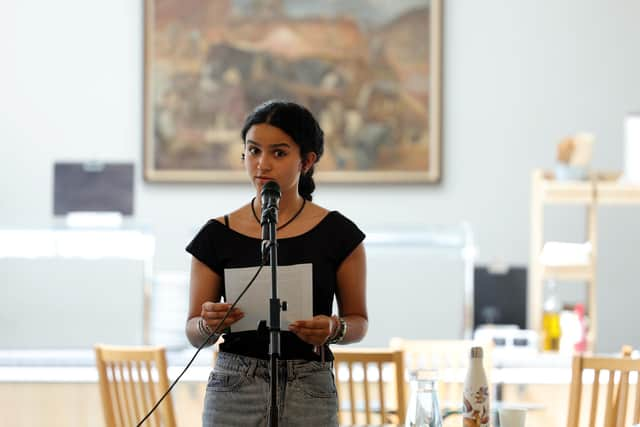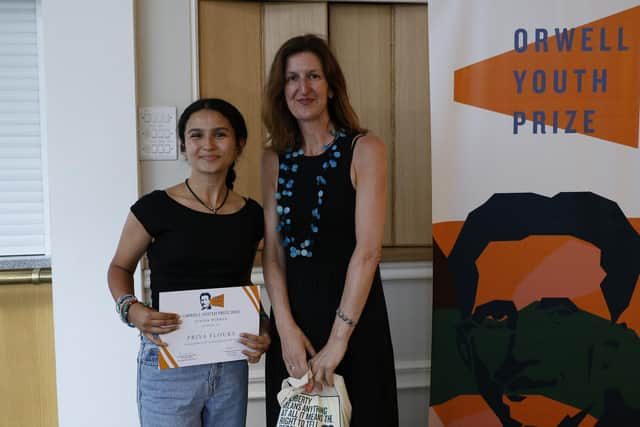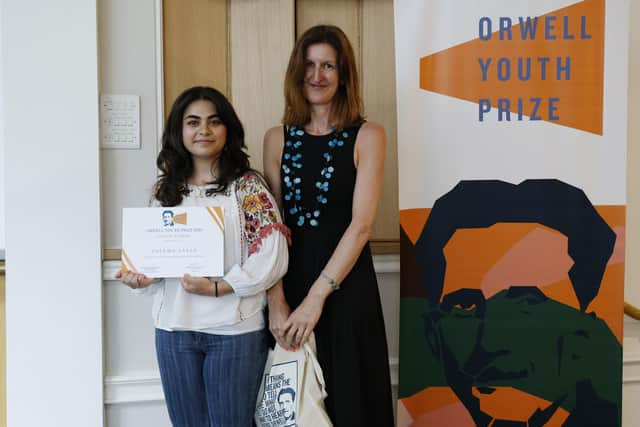Three winners of national essay writing contest discussing power structures came from Aylesbury school
and live on Freeview channel 276
Three students from an Aylesbury secondary school received awards at a national writing competition challenging them to discuss power structures.
Aylesbury High School had three winners in The Orwell Youth Prize 2023. A panel of independent judges selected the winners from a total of 570 entries from across the UK.
Advertisement
Hide AdAdvertisement
Hide AdAylesbury High School students Beth Anker and Priya Floura were winners in the Junior Category (school years 8-11) and Zaeema Assad triumphed in the Senior Category (school years 12-13).


Every year the Orwell Youth Prize is ran as a creative writing competition for 12-18 year olds, inspired by the works of George Orwell, and his commitment to social justice. This year’s theme was ‘who is in control?’
There was a total of four winners in the Junior Category and three winners in the Senior Category.
Included in this year’s panel was Orwell Prize-winning author, Delia Jarrett Macauley; Financial Times global education editor, Andrew Jack; the BBC’s
Advertisement
Hide AdAdvertisement
Hide Addisinformation and social media correspondent, Marianna Spring; and Forward Prize-winning poet, Will Harris.


Chair of judges Delia, said: “We thoroughly enjoyed reading this year’s submissions for the OYP and were impressed by the range of unusual stories, poems, essays and scripts tackling the theme ‘Who’s in Control’. It was rewarding to discover so many well-executed pieces, and we were impressed by (the) creativity and original ideas.”
Entrants can submit writing in any form. Beth won for her essay, Meritocracy: The Politician’s Pipe Dream, which judge Andrew Jack described as ““A well
argued, reflective and strongly researched analysis of the limits and limitations of meritocracy.”


Advertisement
Hide AdAdvertisement
Hide AdPriya won for her short story, Tick Tock, which judge Marianna Spring called “A vivid portrayal of the passing of time and a very clever allegory for the way invisible expectations and routines can control us. Beautifully written – you can feel the seconds ticking away as you read, almost like you are the protagonist.”
Zaeema’s winning piece, The Radcliffe Line, was also described by Andrew Jack as “A powerful reflection on conflicts over personal identity, historical legacy, culture constraints and the limits of individualism.”
All three pieces are available to read on The Orwell Foundation website here, along with the other winners and runners up.
All the shortlisted writers were invited to the Orwell Youth Prize Celebration Day at University College London on Saturday 8 July 2023, where they took part in a creative writing workshop with the award-winning writer and poet Anthony Anaxagorou and performed their work, before receiving their prizes, including a copy of George Orwell’s collected essays, and an Orwell Youth Prize goody bag.
Advertisement
Hide AdAdvertisement
Hide AdThe winners and runners up will also be invited to join The Orwell Youth Fellows, a collective of young writers starting conversations and developing new writing that is responsive to our changing world – and supporting other young people to engage with the prize.
Each year the creative writing project is free for students across the country to enter with additional resources being provided at no cost to participants.